John Veverka & Associates
Main menu:
- Home Page
- Our Range of Services
- Interpretive Coaching
- Interpretive Planning
- Interpretive Plan Outline
- Interpretive Training
- John Veverka Resume
- NEW Advanced Interp. Text Book
- InterpNEWS
- Library
- JVA NEWS, Courses and Updates
- Certificates
- Planning/Design of Interpretive Panels
- Interpretive Writing
- Interpretive Writing Course
- Interpretive Trails Course
- Interpretive Panels Course
- Introduction to Heritage Interpretation Course
- Interpretive Planning & Design of Marketing Brochures Course
- Training for Interp. Trainers
- Interpretive Exhibits Course
- Interpretive Master Planning Course
- Interpretive Planning for Scenic Byways.
- Critiquing and Coaching Interpretive Staff
- Advanced Interpretive Planning
- Interpretive Training Center Course Catalogue
- Interp. for International Visitors course.
- Interpretive Exhibits Evaluation
- Interp. Center Feasibility Analysis Course.
- Interp. for Commercial Tour Providers
- Interpretive Researchers Guide for Visitor Studies
- Interp. Planning for Historic Homes
- Heritage Interpretation Training Center
- Interpretive Planning for Botanical Gardens
- An introduction to planning and presenting live interpretive programs and tours for Museum/Heritage Site Docents and Volunteers.
- Developing Marketing Plans for Heritage & Tourism Sites and Attractions
- Interpretation Book Store
- Heritage Interpretation Resource Center
- Interpretive Planning for Historic Farms
- Developing Successful Partnerships
- Developing Interpretive Outreach Programs
- Community Interpretation Planning
- Interpreting Gravestones and Historic Cemeteries
- Using Interpretation to Accomplish Management Objectives.
- An Interpreters Guide for Survival Economics.
- Innovative Strategies for Interpretive Media and Services Planning.
- A Curators Guide for Developing Gallery Tours.
- Advanced Interpretive Writing - Technical Publications
- Advanced Interpretive Services for Managers, Supervisors, Team Leaders and Sr. Staff.
- Advanced Interpretation for Chiefs of Interp. - Interpretive Managers - Regional Interp. Specialists
- Interpreting Critical Issues.
- Developing Commercial Interpretation for Resorts, Cruise Ships, Campgrounds and Tourism Attractions.
- Planning and developing a new commercial tour guiding business.
- Interpretive Evaluation, Visitor Studies and Site Assessment Center
- The Center for Interpretive Planning Advancement & Excellence.
- Developing Requests for Proposals (RFPs)
- Planning and Facilitating Focus Workshops
- Planning for Interpretive Experiences
- 40 Years a Heritage Interpreter
- Interpretive Techniques - The Rest of the Story Course
- Certified Professional Interpretive Planner Certificate
- Certified Professional Interpretive Program
- Certified Professional Interpretive Writer certificate program.
- Visitor motives for attending interpretive programs.
- Exhibit Rehab Course
- Developing Training Workbooks & Manuals
- Planning for Railroad Museums and Sites.
- Climate Change Interpretation Course.
- When there's nothing left but the story - interp. storytelling.
- Interpreting Legends Myths and Fables
- InterpSHARE - Seminars 2022
- Interpreting Invasive Species
- Interpretiing Edible Insects
- Interpretaive Planning for Climate Change
- HITC Climate Crisis Resource Center
- PUP Members Only
- Starting a new Interp Consulting Business
- Panels 4 Week Course
- Interpretive Writing - 4 Week Course
- Marketing - 4 Week Course
- Intro to Interpretation - 4 Week Course
- Interp Climate Change - 4 Week Course
- Exhibit Rehab 4-Week Course
- Level 1
- Johns Interpreters Blog
- John Interpreters Blog 2
Intro to Interpretation - 4 Week Course
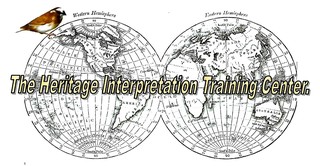
Heritage Interpretation Training Center
An Entry Level Introduction to the Heritage Interpretation Profession
A 4-Week Course with live mentoring.
28th of February - 25th of March 2022
Course Tuition $200.00
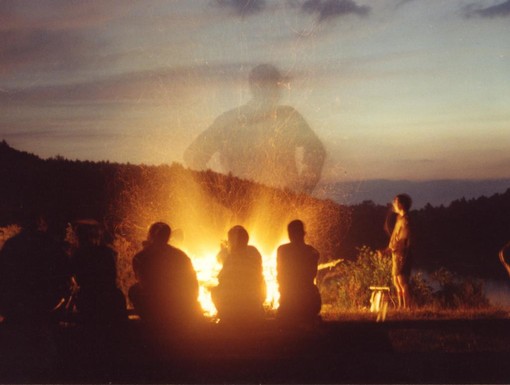
Interp Time - You ready to be an interpreter?
This is a University level introductory course to the heritage interpretation profession for any individual finding themselves working in interpretation but having had no formal training in it, or wanting to change careers to heritage interpretation and needs a basic understanding of interpretive principles, philosophy, theory and methods. This is the same "Introduction to Interpretation" course I taught for several years at Michigan State University, and teach in my residential interpretive training courses today. This is the basic introductory course in interpretive services.
Course learning experiences and content will focus on:
*Introduction to interpretive principles, techniques and theory.
*Review and discussion of the Model of Interpretation
*Developing interpretive themes and objectives.
Audience analysis - who's your market groups
*Innovative interpretive presentation techniques - engage and inspire.
*Developing and conducting interpretive guided tours or programs.
*A overview of your interpretive services self-evaluation
The 4-week introduction to heritage interpretation course has been developed and will be mentored/coached by Prof. John Veverka - Director of the Heritage Interpretation Training Center and with 40 years of experience as an interpretive planning and training consultant.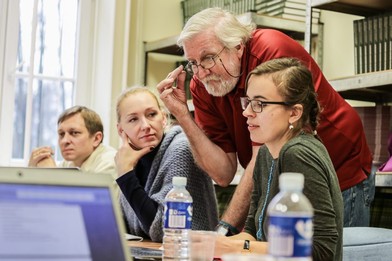
JV teaching heritage tourims at Lithuania University
special summer session.
Course participants will receive:
- Interpretive Master Planning Text Books
- An interpretive services resource library.
- Interpretive Writing Principles Handouts.
- Weekly zoom chats with Prof. Veverka
- A Certificate of Completion from the Heritage Interpretation Training Center
with two (2) CEU unit credits.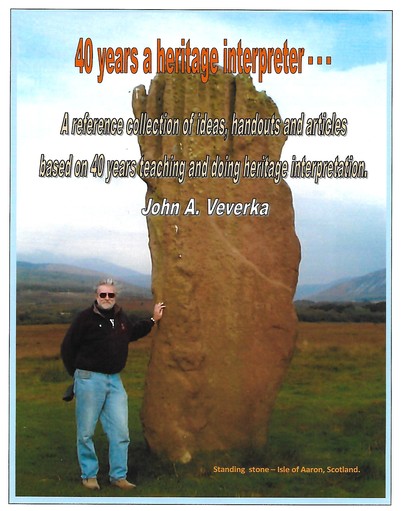
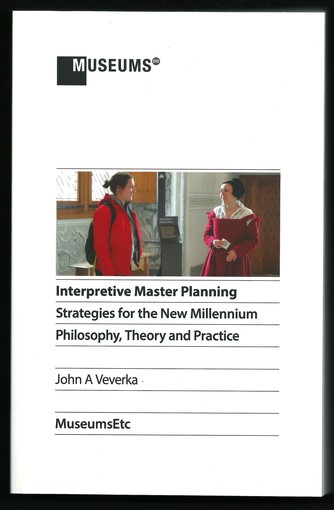
Prof. Veverka will offer weekly ZOOM meetings and discussions. You can also contact Prof. Veverka at any time via e-mail or SKYPE to address any personal project questions at jvainterp@aol.com.
Due to providing adequate time for Prof. Veverka to provide mentor/coaching to participants working on their projects, this course will be limited to 10 participants.
Course Registration
- Pay the course tuition via the course web site PayPal button at the bottom of the web site
page.
- Prof Veverka will send you by e-mail initial course text books and resource materials.
- We will have a course orientation meeting via ZOOM for participants on the 1st of Feb - time
to be decided based on participant time zones.
Course Weekly Content Structure
Week One
Unit 1 - How visitors learn and remember in a recreational learning environment.
Unit 2 - Ten Learning Concepts interpreters need to know, understand and relate to.
Unit 3 - Definitions, Theories and Objectives of Interpretation.
Unit 4 - What makes the communication "Interpretive" - a review of Tilden's Interpretive
Principles.
- Weekly ZOOM discussions with course instructor.
Week Two
- Unit 5 - The model of interpretive communications (we use it for planning any/all interpretive
programs, services or activities).
Unit 6 - Developing interpretive program/services and media objectives.
Unit 7 - Story analysis and developing interpretive themes.
Unit 8 - Understanding your visitors - who are they, what do they hope to gain from your program or interpretive services? Maslow's Hierarchy of Needs. Developing a quick visitor profile and analysis.
- Weekly ZOOM discussions with course instructor.
Week Three
Unit 9 - Interpretive media options to consider.
Unit 10 - Visitor motivations for selecting and attending interpretive programs - interpretive
research review.
Unit 11 - Live Interpretive Program/tour delivery planning: Developing your interpretive
program planning form and check list
- Weekly ZOOM discussions with course instructor.
Week Four
Unit 12 - Using tangibles and intangibles and universal concepts in your interpretive presentation
to better relate to your visitors.
Unit 13 - Self evaluation check list. How do you know you accomplished your interpretive
objectives?
Unit 14 - what's next - professional organizations, conferences, books and courses. What's your game plan for using the knowledge an stills you gain in this course to keep learning more, and sharing your skills with others?
- Final ZOOM discussion for course completion and what's next for you? You did it!!

If you have any questions about this course please feel free to contact me:
Prof John Veverka
jvainterp@aol.com
SKYPE: jvainterp
Chick the PayNOW button to pay the course tuition: